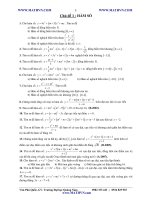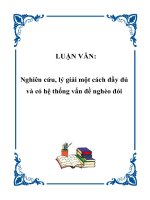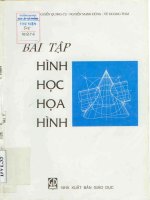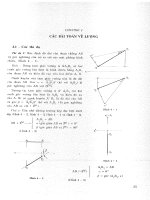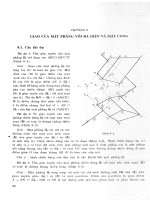Reported speech cuc day du va co bai tap
Bạn đang xem bản rút gọn của tài liệu. Xem và tải ngay bản đầy đủ của tài liệu tại đây (111.03 KB, 8 trang )
Part III: REPORTED SPEECH
There are two ways of relating what a person has said: direct and indirect.
In direct speech we repeat the original speaker's exact words.
He said: " I am working now".
In indirect speech we give the exact meaning of a remark or a speech, without necessary using the speaker's
exact words.
He said he was working then.
When we turn direct into indirect, some changes are usually necessary.
A. Changes in tenses
Direct speech Indirect speech
*Simple present
Present progressive
Present perfect (Progressive)
Simple past
Past perfect
Simple future
Near future
*Modal verbs:
Can
May
Must
needn't have done
can't have done
ought to/ should/ could/ would/ might/ used to/ had
better
* Unreal past tenses after : wish/,as if/ would rather/
sooner and it is time
Simple past
Past progressive
Past perfect (Progressive)
Past perfect
Unchanged
Future in the past ( would/ should + V- bare infinitive)
Future progressive in the past
( would/ should + be + V.ing)
Could
Might
Had to
Unchanged
Unchanged
Unchanged
Unchanged
Note: Các trờng hợp không thay đổi thì khi chuyển từ câu trực tiếp sang câu gián tiếp:
1. Động từ ở mệnh đề chính ở các thì hiện tại và tơng lai đơn.
The farmer says: " I hope it will rain "
-> The farmer says he hopes it will rain.
2. Câu điều kiện loại 2 và loại 3:
He said," If I were you, I would marry her."
-> He said if he were me, he would marry her.
3. Lời nói trực tiếp diễn tả một chân lý.
My teacher said, " The sun rises in the East"
1
-> My teacher said that the sun rises in the East.
B. Change of Adverbs of Time & Place:
Direct speech
Reported
speech
Direct speech Reported speech
1. here 1. there 6. tonight 6. that night
2. this 2. that 7. yesterday 7. the previous day, the day before
3. these 3. those 8. ago 8. before
4. now 4. then 9. tomorrow 9. the following day, the next day
5. today 5. that day 10. next (week….) 10. the following (week…)
C. Change of Pronoun & Possessive Adjectives:
-pronouns and possessive adjectives usually change from first or second to third person except the
speaker is reporting his own words.
Per. Subj. Obj. Poss. Adj. Poss. Pro.
1 I Me My Mine
We Us Our Ours
2 You You Your Yours
3 They Them Their Theirs
3
He Him His His
She Her Her Hers
It It Its its
S + V + O, “ person 1…………………… person 2”
(chóng) t«i (c¸c )b¹n
D. Kinds of indirect speech
1. Statements: ( S + V ...)
to tell + O
S + (THAT) + S +V ....
to say ( to O)
Eg1: They said to us, “These are snakes.”
↔ They told us (that) those were snakes.
Eg2: “I came at 8 o’clock,” he said.
↔ He said (that) he had come at 8 o’clock.
2. Command: V
1
Don’t + V
1
…
to tell
S + + O +
to ask
To + V
1
Eg1: He said to us, “ Keep silent here, please.”
↔ He told us to keep silent there.
Not to + V
1
Eg2: “Don’t laugh at me” said Mary.
↔ Mary asked me not to laugh at her.
2
3. Questions
a/ WH_ Questions:
b/ YES _ NO Questions:
to ask + (O)
S + to want to know
to wonder
+ WH
S + V
+ IF / WHETHER
Eg1: The stranger said, “ Where is Tra Vinh town school?”
↔ The stranger asked where Tra Vinh town school was.
Eg2: “ Did you see him?” she said to me.
↔ She asked me if / whether I had seen him.
c. Tag questions = YES _ NO Questions
to ask + (O)
S + to want to know
to wonder
+ IF / WHETHER
S + V
Eg : He asked, "You did the homework, didn't you?"
-> He asked if I had done the homework.
d. Alternative questions
Eg :"Do you like meat or fish?"
-> He wanted to know whether I liked meat or fish.
E. Some special kinds:
1. Offers:
Indirect speech:
S + to offer
sb st
sb to do st
Direct speech
- Would you like.....?
-Do you like....?
- Do you want....?
-Shall I/ Can I/ Could I do( sth )(for sbd)?
- I will / would/ could/ shall do st (for sb) if sb like
- I wonder if I could/ can do st for sb
- Do you think if I can / (it possible for me) to do st?
- Is it possible for me to do st?
Eg : He said: "Could I carry this heavy box for you?"
-> He offered to carry that heavy box for me.
2. Invitations:
Indirect speech:
to invite sb to do st
Direct speech:
- Would you like st/ to do st?
- Do you like/ do you want to do st?
- You had better do...
- If I were you, I would....
3
- Are you free to do ...
" Do you want to go home with me?"
-> She invited me to go home.
3. Suggestions.
Indirect speech:
to suggest doing st/ sb doing st/ that S + should + V
Direct speech - Let's do
-Shall we….. ?
-Do you feel like……?
-Why don't we... ?
-Why don't you……?
-What/ How about... ?
4. Advice
Indirect speech:
to advise sb to do/ not (never) to do st
Direct speech
- S+ should + V
- S+ had better + V
5. Requests
Indirect speech:
to request/ to ask sb to do st
Direct speech
- Imperatives
+ Will you do st
+ Can you do st
+ Could you do st
+ Would you mind doing st?
+ Would you be so kind as to do st?
+ Would you kindly do st?
+ I will be/ would be grateful if you can/ could...?
+ I wonder if you can/ could....
+ Do you think if you could....
6. Promises
Indirect speech: to promise to do st Direct speech : Ok, I’ll’’. / I promise I’ll’
7. Exclamations
Indirect speech: Direct speech
to exclaim that S+ V... - What a/ an + noun...
- How adj/ adv + S + V
- what a/ an + noun + S+V
Eg : " How beautiful your girl is"
He exclaimed that my girl was beautiful
4
Exe rci ses:
I. Change into reported speech ( Command)
1. Ha said to Mai: “ Don’t touch the electric wires”
……………………………………………………………………………………………
2. “Please, don’t tell anyone the news,” Ha said to her sister.
……………………………………………………………………………………………
3. “Don’t drive so fast” Ha said to Minh.
……………………………………………………………………………………………
4. Please remove your shoes before entering” Ha said to Hang.
……………………………………………………………………………………………
5. “Ba, don’t interrupt me when I’m meditating” Ha said to Ba.
……………………………………………………………………………………………
6. First switch on, then wait for 2 minutes” Ha said to Nhung.
……………………………………………………………………………………………
7. “Hanh, take the man to the cells” Ha said to Tung.
……………………………………………………………………………………………
8. “Don’t forget to write me a letter every week” Ha said to her friend.
……………………………………………………………………………………………
9. Ha said: “Don’t make so much noise, Hieu”
……………………………………………………………………………………………
10. Ha said to Mai, “You’re going to post the letter, don’t forget.”
……………………………………………………………………………………………
II. Change into reported speech ( Statements)
1. He said, “I don’t know what happened.”
……………………………………………………………………………………………
2. She said, “I went to the doctor yesterday.”
……………………………………………………………………………………………
3. He said, “I’m cutting off the main valve.”
……………………………………………………………………………………………
4. She said, “I’ll write him a prescription.”
……………………………………………………………………………………………
5. They said, “We’re going to the drugstore.”
……………………………………………………………………………………………
6. He said, “The doctor gave me some pills.”
……………………………………………………………………………………………
7. She said, “I go to the supermarket every day.”
……………………………………………………………………………………………
8. He said, “I have received the envelope.”
……………………………………………………………………………………………
9. They said, “We visited Cannery Row.”
……………………………………………………………………………………………
10. She said, “I feel very sick.”
III. Change into direct speech
5


